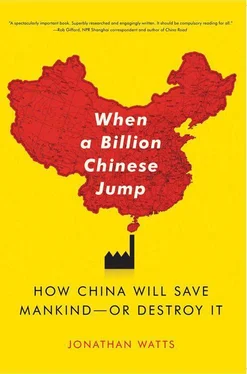The route was determined by a confluence of influences. Tracy McVeigh of the Observer commissioned the original journey from Shangri-La to Xanadu in search of China’s ideals. Lu Jie, curator of the Long March art project—a neighbor in Beijing’s Dashanzi district—inspired the travel-narrative approach. Colin Robertson, formerly of Scribner’s, encouraged me to venture further into green territory. Photographers Mathias Braschler and Monika Fischer set the bar for ambitious on-the-road reportage.
During this writing expedition I was grateful for the accommodation and tranquillity provided by Michiko Fukui, Philip Lote, Mary Hennock, and Miwa Okubo. Thanks too to Yoyo Gill for giving up her bed on more than one occasion during my stays at her parents’ home in Shanghai.
Along the road, guidance came in many forms. Advice on how to survive a book project was generously shared by Jasper Becker, Jason Burke, Paul French, Rob Gifford, John Gittings, Alexandra Harney, James Kynge, Jo Lusby, Richard McGregor, Philip Pan, Ilaria Maria Salsa, Catherine Sampson, and Zhang Lijia. During the difficult early months of compilation I was kept on track by Paul Jackson, Dominic Al-Badri, Mary Kay Magistad, Nick Bridge, and Jes Randrup Nielsen, all of whom put in a yeoman’s work critiquing the garbled first drafts.
At the editing stage, Henry Volans at Faber was a font of sage suggestions while Trevor Horwood cleaned and polished the manuscript with perspicacity and good humor. Chapters were improved with thoughtful feedback from Sharmilla Beezmohun, Chris Gill, Duan Xiaoli, Tim Johnson, Lauren Johnston, Rupert Wingfield-Hayes, and Yang Ailun, who read some or all of the book despite the busy schedules of people at the top of their game.
Research was greatly helped by several superb blogs and websites. Particular thanks to Isabel Hilton for China Dialogue, Xiao Qiang for China Digital Times, Roland Soong for ESWN, Jeremy Goldkorn for Danwei, Sam Crane for the Useless Tree, Jeremiah Jenne for Jottings from the Granite Studio, and Rebecca MacKinnon and John Kennedy at Global Voices Online. Covering this much ground would have been difficult without the Internet for reference. Gratitude is also due to those at bricks-and-mortar institutions, such as Kerry Brown at Chatham House, Hugo de Burgh at the University of Westminster’s China Media Centre, Kjetil Haanes of the Norwegian Union of Journalists, and Alex Pearson, Peter Goff, and Jenny Niven at the Bookworm.
Specific advice on where to go and whom to talk to about environmental issues was provided by Marcus Haraldsson, Duncan Hewitt, Calum MacLeod, Richard Stone, and Marga Zambrana. As the bibliography and notes show, I have also followed up on stories and tips by many others in the vibrant foreign-correspondent community in China, including Jonathan Ansfeld, Naoko Aoki, Andrew Batson, Lindsey Beck, Chris Bodeen, Henrik Bork, François Bougon, Tania Branigan, Fred Brown, Chris Buckley, Steve Chao, Chi Yin, Dan Chung, Clifford Coonan, Elizabeth Dalziel, Mure Dickie, Bessie Du, Gady Epstein, Tomas Ezler, Maureen Fan, Jaime FlorCruz, Peter Ford, Peter Foster, Emma Graham Harrison, Lindsey Hilsum, Lucy Hornby, Charles Hutzler, Matt Jasper, Kim Rathcke Jensen, Joe Kahn, Sarah Keenlyside, Jutta Lietsch, Benjamin Lim, Louisa Lim, Melinda Liu, Andreas Lorenz, Barbara Luethi, Jane Macartney, Scott Macdonald, Mark and Karen Magnier, Kathleen McLaughlin, James Miles, Tom Miller, Isolda Morillo, Bernardo de Niz, Brad Olson, Evan Osnos, Peter Parkes, Tom Pattinson, Brice Pedroletti, Ted Plafker, John Ray, Peter Sharp, Craig Simons, Richard Spencer, David Stanway, Eugene Tang, Didi Kirsten Tatlow, Mary-Anne Toy, Alan Wheatley, Holly Williams, Jim Yardley, and no doubt some others I have omitted. I will be forever grateful to Stephen McDonell, Robert Hill, Yao Liwei, and Jiang Xin of ABC for finding space in their tent for me during the postearthquake thunderstorm in Yingxiu. Particular thanks to Sami Sillanpää, with whom I shared an office, many great assignments, and an awful lot of bad jokes.
Deeper into the subject and the territory, I was helped by the expertise and openness of professors at Beijing’s top universities and the Chinese Academy of Sciences, notably Hu Angang, Li Can, Jiang Gaoming, Song Huailong, Wang Tao, Yao Tandong, Zhou Mingjiang, and Zou Ji. Guidance on specialist issues was also provided by Chimed-Erdene Baatar, Nicholas Bequelin, Arlene Blum, Carter Brandon, William Callahan, Ellen Carberry, Joel Cohen, David Concar, Robin Grayson, Arthur Kroeber, John MacKinnon, Isaac Mao, Charlie McElwee, Todd Meyer, Bob Moseley, Robin Munro, Sidney Rittenberg, Kate Saunders, Andrew Scanlon, Deborah Seligsohn, Vance Wagner, Alex Wang, Wang Fuqiang, Wang Sung, Alex Westlake, Tony Whitten, Matt Whitticase, Julian Wong, Xie Yan, and Nick Young.
On the ground, I have at times been taken on propaganda tours by government officials and on other occasions I have had to use subterfuge to cover sensitive stories with the help of local activists. Many of those who helped have asked to remain anonymous but I can thank the following institutions and groups: Chongqing Green Volunteers League, Friends of Nature, Global Witness, Green Camel Bell, Green Longjiang, Greenpeace, International Rivers, the Nature Conservancy, Traffic, the Wildlife Conservation Society, the World Wide Fund for Nature, the Chongqing and Dalian propaganda departments, The National Development and Reform Commission, and the Institute of Ecological Civilization Research. The International Campaign for Tibet and Free Tibet have also been very helpful.
Among the journalists and conservationists who have provided time or insight are Chen Guidi, Dai Qing, Feng Yongfeng, Jessy Lee, Sarah Liang, Ma Jun, Nie Bei, Tang Xiyang, Wang Yongchen, Wu Chuntao, Wu Dengming, Yang Yongping, Yu Xiaogang, and Zhang Jicheng. I would like to express respect too for the courage of lawyers such as Teng Biao and Gao Zhisheng, and citizen activists such as Chen Guangcheng, Hou Wenzhuo, Hu Jia, Liu Xiaobo, and Zeng Jinyan, who campaign on sensitive issues, including the environment, and have sometimes suffered violent retribution or imprisonment by the authorities.
I would not have made it to the end without the support and understanding of my wife and daughters in Beijing and the words of encouragement from my mother, sister, and stepfather on the other side of the world. Many friends shared warmth, wisdom, or much-needed mickey-taking, but I am particularly grateful to Nick Bonner, Andy Brock, Chen Ying, Jocelyn Ford, Kristen McQuillin, Sumiko Okita, Qin Liwen, Gareth Richards, Wang Chunhui, Wang Xiaoshan, and Yoyo Yoshiko. Special thanks to Murray Sayle, a master of the foreign correspondent’s craft, whose essay “Overloading Emoh Ruo” was an inspiration for this book.
Finally, how can I express sufficient gratitude to those who have provided so much fine research and warm companionship over these years? One of the privileges of being a correspondent in China has been working with talented assistants, whose insight, sensitivity, and humor have added enormously to the pleasure and profit of traveling this vast country. Jin Jian, Zhou Xingping, Huang Lisha, Chen Shi, Chen Ou, Chang Yiru, Yu Hongyan, Xuyang Jingjing, and Cui Zheng know best that these pages would not be the same without their interpretation, and that for big chunks of the narrative, the “I” ought really to be “we.”
I am in debt to them, to the others named above, and the many other friends and sources I have not mentioned, but whose help has made this book feel, at times, like a collaborative “cloud” project more than an individual work. I take sole responsibility for the interpretation and personal polemic, but ultimately it is cooperation and a shared acceptance of “facts” that moves people. To all those who have contributed, thank you.
Читать дальше










